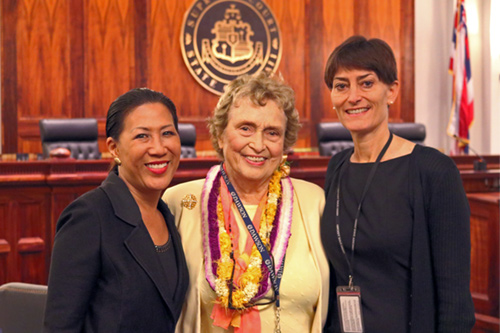Judiciary Hosts Continuing Legal Education on Hoʻoponopono
Posted on Mar 17, 2017 in Featured News, News & Reports
Beadie Kanahele Dawson, Esq. (center), with the Hawaii State Judiciary Center for Alternative Dispute Resolution’s Director, Cecelia Chang (left), and Research Analyst, Anne Marie Smoke (right).
HONOLULU, HI – A special continuing legal education event on the successful application of Hoʻoponopono in legal settings and mediation was hosted by the Hawaii State Judiciary’s Center for Alternative Dispute Resolution (CADR) on March 16, 2017. “Native Hawaiian Peacemaking Concepts,” presented by Hoʻoponopono Haku Beadie Kanahele Dawson, drew more than 150 attorneys and mediators to the State Supreme Court courtroom and Hoapili Hale, the Maui courthouse, where the event was telecast to participating judges and court personnel. This event was co-sponsored by the Native Hawaiian Bar Association, the Hawaii State Bar Association ADR and Litigation Sections, the Association for Conflict Resolution – Hawaii, and the Mediation Center of the Pacific.
Dawson, a 1981 graduate of the University of Hawaii William S. Richardson School of Law, practices law with the firm Settle Meyer Law. She is trained and certified as a Hoʻoponopono Haku (leader) by the late Malia Craver, a well-known and highly respected expert in Hoʻoponopono at the Queen Liliuokalani Trust and Children’s Center. Dawson was also recently honored as a 2017 Honpa Hongwanji Mission of Living Treasure of Hawaii.
Dawson spoke on Hoʻoponopono, the traditional Hawaiian art of conflict resolution. Her message: Hoʻoponopono is not just for Hawaiians and not just for families. Its principles and practices can be effectively applied to resolving a wide range of legal disputes involving international, business, land title, land use, and community-based issues. Dawson incorporated real-life examples from her use of Hoʻoponopono and mediation to bring resolution to situations that had been previously deemed unsolvable.
“The law does not always provide practical solutions for every problem, and not every problem belongs in the courts,” said Cecelia Chang, Judiciary CADR Director. “At the Center for Alternative Dispute Resolution, it’s our mission to make alternative dispute resolution processes broadly available to Hawaii residents and state and local government agencies. Long before our present day systems of justice and dispute resolution, Hoʻoponopono was used to settle disagreements in Hawaii.”
Litigation attorneys, corporate counsel, and ADR attorneys are often tasked with helping their clients find ways to resolve complex legal disputes. Hoʻoponopono is a process that seeks to restore a desirable balance to family and communities. Unlike other forms of alternative dispute resolution which focus on reaching certain outcomes, Hoʻoponopono is a process focused on restoring the relationships between the parties involved. Hoʻoponopono is introspective and inward looking. It does not look externally to place blame. Participants look inward and consider what they have done to contribute to the dispute. Hoʻoponopono is a process that promotes introspection that leads to personal accountability, confession, apology, forgiveness, mended relationships and the emergence of a collective solution to a problem.
“We encourage parties in litigation to ask their attorney if alternative dispute resolution may be beneficial for their situation,” said Chang. “Although conflict may be a part of life, alternative dispute resolution can open the door to workable and lasting solutions. Alternative dispute resolution includes arbitration, mediation, and, as Beadie Dawson explained today, Hoʻoponopono.”
For those seeking a private resolution of their cases without the uncertainty, stress, time, and expense often involved in litigation, the Hawaii State Judiciary provides alternative dispute resolution services, including arbitration (non-binding), settlement conferences (conducted by judges), and mediation services. For cases on appeal, the Judiciary’s Appellate Mediation Program (AMP) offers mediation in selected civil cases. Retired judges and attorneys appointed by the Supreme Court serve as volunteer mediators. The appeal is temporarily stayed during the mediation. A variety of cases are resolved through the program, including foreclosure, landlord-tenant, business, and divorce cases.
For more information contact:
The Center for Alternative Dispute Resolution
Aliiolani Hale
417 South King Street, Room 207
Honolulu, Hawaii 96813
Phone: (808) 539-4ADR (4237)
E-mail: CADR@courts.hawaii.gov
Web: www.courts.state.hi.us/services/alternative_dispute/alternative_dispute_resolution
